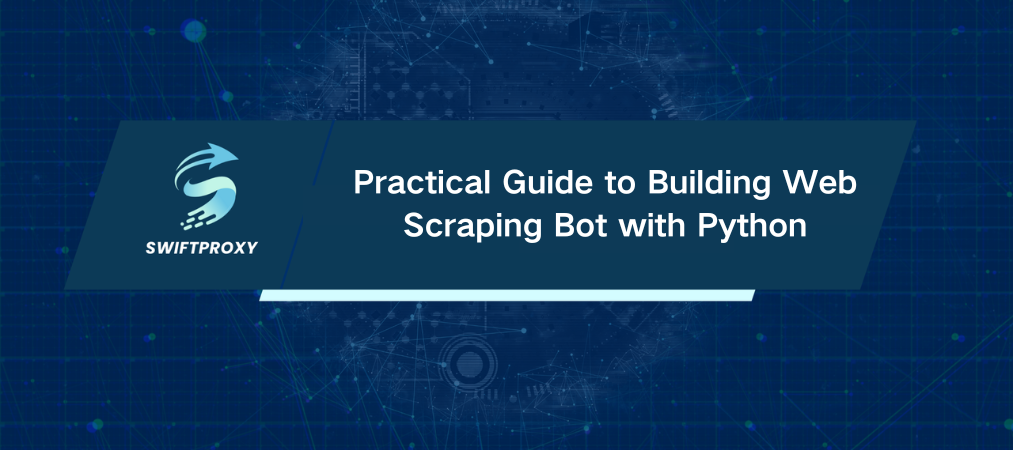Practical Guide to Building Web Scraping Bot with Python

Data isn't just power anymore—it's survival. And if you want to stay competitive, you need more than just spreadsheets. You need smart ways to collect, analyze, and act. That's where web scraping bots come in.
These bots aren't science fiction. They're already crawling across the internet, collecting prices, tracking reviews, pulling job listings, and helping businesses make razor-sharp decisions—every single day.
Let's break it down.
What Is a Web Scraping Bot
Think of a web scraping bot as a digital assistant that never sleeps. It automatically visits websites, grabs specific information you've told it to look for, and saves it for later. Fast. Quiet. Efficient.
Let's say you're running an eCommerce store. Your bot can scan competitor sites and tell you if they’ve dropped prices. If they have, you react. If not, you win on margin.
Or maybe you're a recruiter. You need the latest job posts from 50 different company websites. A scraping bot can collect those listings in minutes—not hours.
If there's data on a public page, a web scraping bot can probably get it.
Real-World Uses That Actually Matter
Let's move past theory. Here's what people are actually using scraping bots for:
Price Monitoring: Retailers constantly scrape competitor pricing. Why? Because staying one step cheaper means more clicks and more sales.
Job Aggregation: Think Indeed or ZipRecruiter. Their bots gather listings from across the web so users don't have to.
SEO and Marketing Research: Marketers scrape search rankings, keyword trends, backlinks, and content metadata to guide their strategy.
Review Mining: Brands want to know what customers are saying—on every platform.
Competitor Intelligence: Who's launching what, where, and at what price? A scraping bot can answer that before your coffee finishes brewing.
The Risks of Web Scraping
Here are the most common risks:
Legal Trouble: Scraping restricted data can result in lawsuits or heavy fines.
Getting Blocked: Many sites detect scraping patterns and blacklist your bot.
Crashing Sites: Hit a server with too many requests too fast? You could slow down or even crash it.
Data Inaccuracy: Page structures change. If your scraper isn't updated, your data could be wrong—without you even knowing.
Want to stay safe? Use rotating proxies. Respect rate limits. And monitor for site structure changes.
Scraping is a powerful tool—but it's not a "set and forget" kind of system.
How Do Web Scraping Bots Actually Work
Let's demystify it. A bot works like this:
Fetch: It opens a webpage.
Parse: It reads the HTML.
Extract: It pulls out the info you want.
Store: It saves the data to a file or database.
Repeat: It moves to the next page and starts over.
Still too abstract? Here's a practical analogy:
Imagine the bot as an intern. You hand them a list of product pages. They open each one, look for prices and product names, write them down in a spreadsheet, then move to the next. Only difference? The bot works 100x faster—and never asks for coffee breaks.
Building a Simple Scraper
You don't need to be a senior dev to build a scraper.
Here's a quick example using Python and BeautifulSoup:
import re
import requests
from bs4 import BeautifulSoup
url = "https://example.com/residential-proxies/"
resp = requests.get(url)
resp.raise_for_status()
soup = BeautifulSoup(resp.text, "html.parser")
cards = [
a for a in soup.find_all("a", href=True)
if "Buy Now" in a.get_text(" ", strip=True)
]
plan_re = re.compile(r"(\d+GB)")
per_gb_re = re.compile(r"\$(\d+(?:\.\d+))\s*/GB")
tot_re = re.compile(r"Total\s*\$(\d+(?:\.\d+))")
for card in cards:
txt = card.get_text(" ", strip=True)
m_plan = plan_re.search(txt)
m_pgb = per_gb_re.search(txt)
m_tot = tot_re.search(txt)
if not (m_plan and m_pgb and m_tot):
continue
print(f"Plan: {m_plan.group(1)}")
print(f"Price per GB: ${m_pgb.group(1)}")
print(f"Total price: ${m_tot.group(1)}")
print("-" * 30)
This script fetches a pricing page, finds the "Buy Now" cards, and extracts plan details. Clean. Simple. Effective.
Prefer no-code or low-code? Try Octoparse or ParseHub. Drag. Drop. Done.
Final Thoughts
Web scraping bots are everywhere—and for good reason. They help businesses unlock data that fuels smarter decisions. Whether you're monitoring competitors, tracking prices, gathering reviews, or collecting job listings, a scraper is your go-to tool.
But don't get sloppy. Understand the legal limits, respect ethical boundaries, and always keep your bot under control.

















































